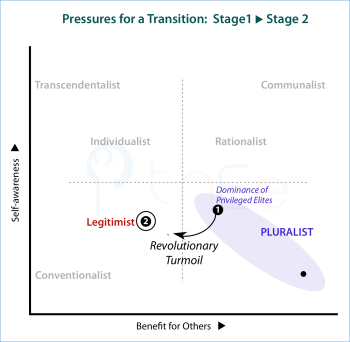Political Transition #1
The Problem with Privileged Pluralism
is controlled by just a few elite in-groups, and it is at this point because there is no rule of law covering everyone equally.
Privileged elites rarely get arrested, except as part of political intrigue—when trumped up charges or secret executions are the norm. Nor do they suffer penalties for what would be called «crimes» for most members of society.
So there is a deep and often impassable gulf between the rulers and the ruled:
-
the rulers have no accountability;
&
- the people have little redress for wrongs done to them.
Pressures for Change

Despite the intensely conservative effect of tradition and the all-too-human dislike of change, forces for change cannot be wholly avoided.
![]() Just consider the effects of...
Just consider the effects of...
In addition, the political classes tend to become too oppressive, too corrupt, and attracted to long pointless wars and excessive taxation of the people.
At some point, the status hierarchy—which was historically developed and seemed wholly natural, justified or at least inevitable—starts to look like a cartel blocking the well-being of the majority in society.
People become resentful and start agitating for more of the social goods, and for better treatment. Some start thinking that life is not worth living, or they get openly angry. Many allow themselves to see that the disposition of power and wealth is unfair, self-perpetuating and unnecessary.
The result is revolutionary turmoil with severe social disruption and a degree of violence. Society only settles if something new emerges: institutions that allow everyone to participate equally in some sense.
Every era and every society will have its own distinct story of polemic and struggle, but read on for a ...
Protests break out ...
in the face of demonstrations and petitions, the elites usually promise to improve matters. However, any change is purely token. Even that token may be watered down or conveniently forgotten once the unrest has settled and everyone has gone home.
Sometimes changes are legislated, but the new laws may not be implemented properly, either because custom and habit support the status quo, or because elite officials simply refuse to cooperate.
then social turmoil grows ...
Repeated failure by elites to respond and worsening social conditions eventually lead to bigger demonstrations and an escalation of conflict.
This typically involves attacks on symbols of elite privilege, and killings of members and servicers of the elites.
then overt, deep, antipathetic divisions in society emerge ...
Active disruption of daily life by oppressed groups leads to such social turmoil that everybody feels a need to take one side or the other.
Often the more educated (e.g. some intellectuals, students) provide ideological support and are in the vanguard of change.
until violence is inevitable ...
Cultural elites often cannot comprehend the benefits of change and feel entitled to their luxury, so they respond with repressive measures.
Large swathes of the population, derogatively called «peasants» or «the masses», come to realize that armed insurrection is the only way to generate change and obtain a more just society.
More about revolutionary turmoil.
-
The required solution is incorporation of values and institutions, and that is where we find that democracy begins.
Originally posted: July 2009; Last updated: 27 Mar 2010